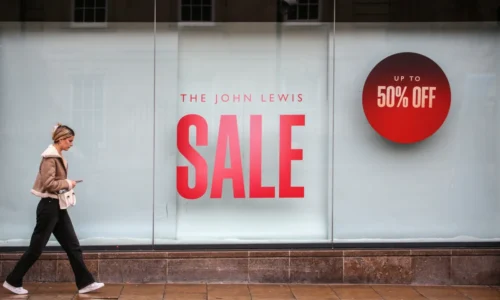Over fifty percent of companies want to increase prices in the forthcoming three months due to a “pressure cooker of escalating costs and taxes,” as reported by one of the UK’s leading industry associations.
The British Chambers of Commerce (BCC) reported that their survey of over 5,000 companies indicated that confidence has “plummeted,” reaching its lowest point in two years.
As a result of the Budget, which proposed an increase in the national insurance contributions (NICs) paid by businesses beginning in April, over two-thirds of respondents told the BCC that they were concerned about taxes being imposed.
Rising National Insurance Contributions Spark Worries Over Tax Burdens for Businesses
A representative for the Treasury stated that the Budget provided stability for businesses, adding that more than half of companies would either receive a reduction in their National Insurance bills or do not see any change at all.
There is a risk of stoking inflation when prices are raised at a time when many people are having difficulty keeping up with the cost of living.
Despite the fact that the rate of inflation, which is a measurement of the rate at which prices are increasing, has dropped significantly since reaching historic highs in 2022, it has increased in both October and November.
Following the publication of growth data that were less than satisfactory shortly before Christmas, the strength of the economy in the United Kingdom has come under scrutiny.
There was no growth in the economy during the months of July and September, according to the most recent official figures, and there was a contraction for the month of October.
After the Labour government made boosting the economy its primary goal, the numbers were perceived as a blow to the government’s efforts to improve the economy.
Separately, KPMG has projected that the rate of growth will quicken this year, with the economy expanding by 1.7% compared to 0.8% in 2024. This is a significant increase over the previous year’s growth rate of 0.8%.
As a result of stronger pay growth and lower interest rates, it anticipates that consumers would “ramp up the pace of spending” as household incomes continue to increase significantly.
KPMG, on the other hand, issued a warning that the acceleration of economic development “could come at the cost of higher and more persistent inflation, as businesses pass on the cost of revenue increases.”
Several businesses have already issued warnings that the implementation of budgetary measures, such as the increase in employer NICs and the increase in the National Living Wage, could result in the loss of jobs and an increase in prices.
According to Kevin McNamee, chief executive officer of Denroy Group, a maker of plastic items situated in Belfast that employs 250 people, the combined impact of the adjustments to the minimum wage and national insurance will cost the company “hundreds of thousands of pounds, it’s really significant.” McNamee made this statement to the BBC.
He stated that it was “probably inevitable” that the prices of certain of their products would have to increase in order to make up for the price increases that were incurred.
“The focus now will be on boosting productivity, reducing headcount or certainly not adding to the headcount as the business grows and driving that productivity.”
According to him, businesses had been “shocked” by the modifications made to the national insurance system.
“It’s hard to see how the Budget incentivises businesses to invest to grow, we’ve had our pockets picked to an extent here.”
On the other hand, Dame Irene Hays, the proprietor and director of Hays Travel, stated to the BBC that she did not observe a lack of confidence in the travel industry.
According to what she shared with the Today show, the company, which has over 3,500 employees, has seen a 22% increase in bookings so far this year.
“We have been around for 45 years now, and we have managed a business through lots of different administrations,” Dame Irene remarked, despite the fact that changes to the National Insurance (NI) and the national living wage would inevitably result in an increase in prices.
“There are always changes on costs… and it’s a case of just being very careful and managing those as best we can.”
The announcement that employers’ national insurance contributions would increase from 13.8% to 15% beginning in April of this year was made by Chancellor Rachel Reeves of the United Kingdom in the autumn Budget.
In addition, she confirmed that the National Living Wage would be raised from £11.44 to £12.21 per hour beginning in April after the previous increase.
Between the 11th of November and the 9th of December, the BCC gathered information from over 4,800 firms located throughout the United Kingdom. 91 percent of the companies that were polled were classified as small and medium-sized organizations, which means that they had fewer than 250 employees.
55% of the companies that took part in the poll stated that they anticipated increasing their prices within the next three months. This is an increase from 39% of the companies that responded to the survey during the previous quarter.
I found that 63 percent of businesses were concerned about taxes. Since 2017, when the business group first started tracking the statistics, that was the greatest level that has been reached.
Government Defends Budget, Claims Stability and Growth Will Follow
The BCC said that confidence has decreased, with 49% of businesses anticipating an increase in sales over the course of the following year. This was the lowest level since the aftermath of the mini-budget in late 2022, according to the business group that came out of the meeting.
Shevaun Haviland, the director general of the BCC, stated that the frightening reverberations of the Budget are readily apparent in the survey data that they have collected.
According to a pressure cooker consisting of growing prices and levies, the trust of businesses has decreased.
Companies of varying sizes and types have informed us that the increase in the national insurance premium is particularly detrimental. Numerous companies have already begun to reduce their investments and have indicated that they would be forced to raise their pricing in the coming months.
“We delivered a once-in-a-parliament Budget to wipe the slate clean and deliver the stability that businesses so desperately need,” said a representative for the Treasury Department.
“We have made certain that more than half of the employers would either experience a reduction in their National Insurance bills or will not see any change at all.
“We are bringing back political and financial stability, creating the conditions for economic growth through investment and reform,” the spokesperson stated in addition.

Salman Ahmad is known for his significant contributions to esteemed publications like the Times of India and the Express Tribune. Salman has carved a niche as a freelance journalist, combining thorough research with engaging reporting.















